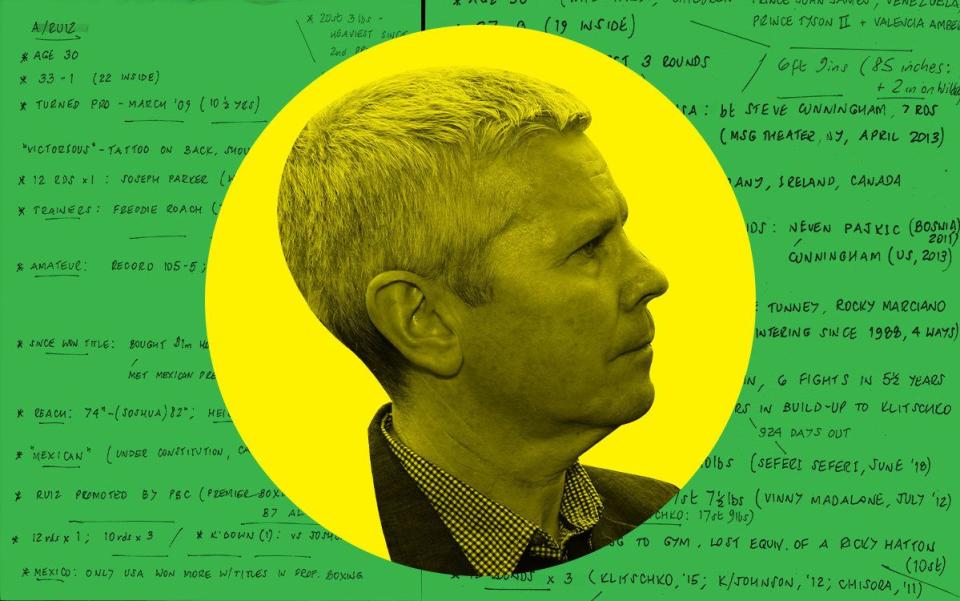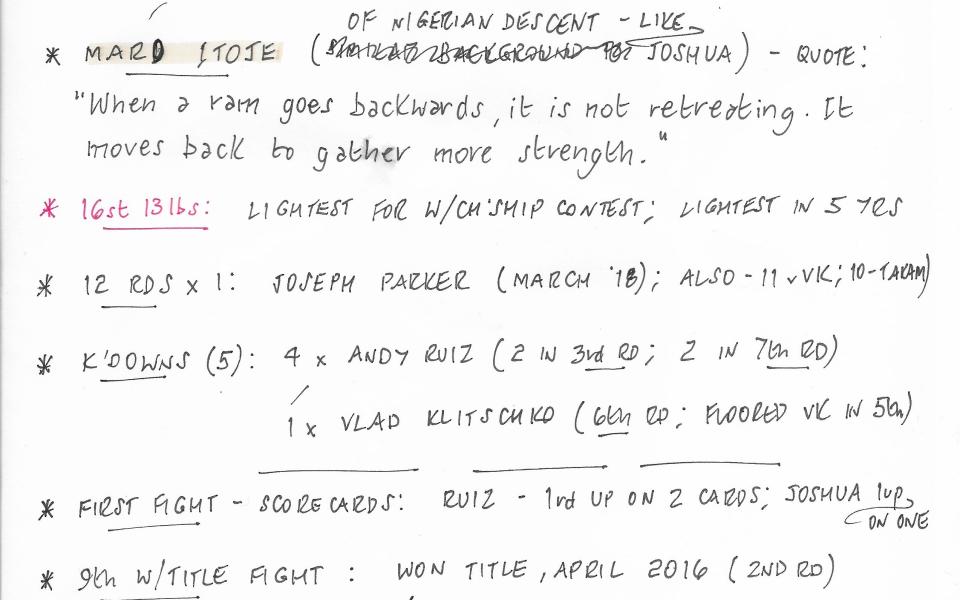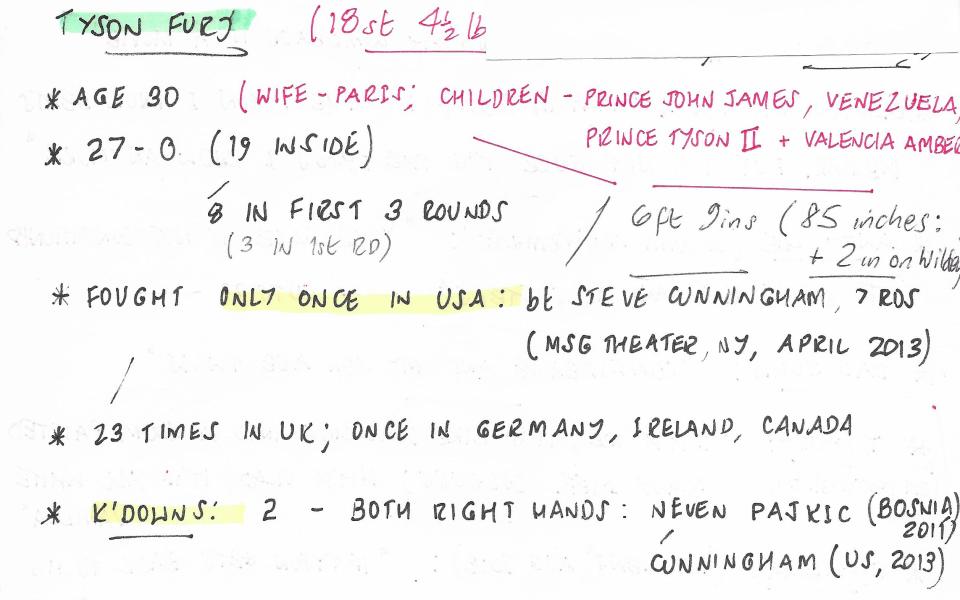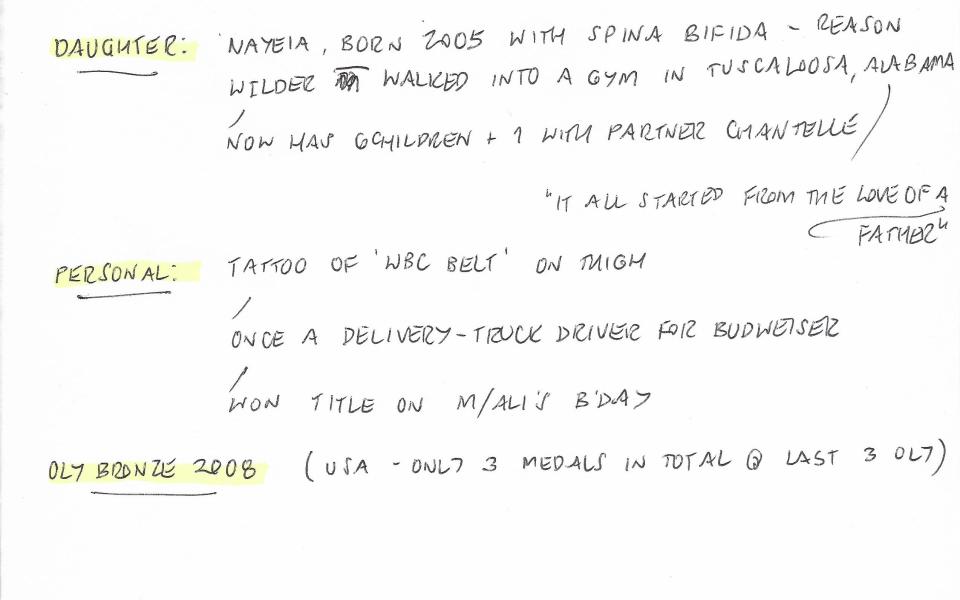How sports commentators keep note: Mike Costello on boxers hearing his live commentary

This is the latest in a series of interviews with Britain's best-loved sports commentators. Alan Tyers has also spoken to to Ali Mitchell and Dan Norcross of TMS, rugby's Sonja McLaughlan, football’s Guy Mowbray, and racing’s Richard Hoiles.
Mike Costello has been the BBC's boxing correspondent since 2005 and is also the athletics correspondent; it's hard to think of many broadcasters who have achieved such excellence in more than one sport.
He has been a passionate, informative, and fair voice on the radio for decades, with highlights including Super Saturday at the 2012 London Olympics and a string of the biggest fights.
Here, he shares his notes from the first Deontay Wilder and Tyson Fury fight, as well as the rematch of Anthony Joshua vs Andy Ruiz.

AT: What’s this note here, in your notes from the Anthony Joshua bout, about England rugby player Maro Itoje?
Mike Costello: It’s a Nigerian proverb: “When a ram goes backwards it is not retreating; it moves back to gather more strength.”
I’d seen this quote from Itoje, it was from the Rugby World Cup about his own situation. I knew that he is from a very similar background to Joshua and that they know each other pretty well. It struck me as apposite for Joshua’s rematch with Ruiz.
But when you have something like that, it can be dangerous to try and include a quote, a story. You can’t be sat there with your head down reading when the fighter is walking to the ring, say. What if something happens, someone throws a bottle? You are always taking a gamble if you introduce a story, you really have to make sure he doesn’t get pinned as you are half way through a story.
Although over the course of that Ruiz rematch, when it became clear that Joshua was intent on going the distance and playing it safe, I suppose I could have dropped it in. I can’t remember if I said it or not, in fact. But that’s radio: you have to grab the moment.
You’ve got a few stats here but not a massive amount...

Yes, I’d have a few things but that’s something that has changed even over my time. Boxing stats used to be a really specialist area, there’d be guys who’d collate them all, long-hand, and you’d have to put in a request half way around the world for the information and so there was that sense that you had got hold of something special that the average listener isn’t going to have access to. Nowadays everyone can get that information in a few seconds so it’s less about that and more about giving a sense of the show, of the occasion.
One thing about boxing though is that you never quite know when the fight is going to start. Premier League football, 4.05pm on a Sunday or what have you: it’s kick off. But with boxing, it’s all dependent on the undercard, you might have lots of time or you might not have much. It’s handy to have a few bits of information if you have to fill but you don't want cram things in. I have seen that present difficulties for inexperienced presenters, and some experienced ones as well come to that. That sense you get that they’ve done a ton of homework and blimey are you going to hear about it.
How do you bring the listener in and make them feel part of the occasion?
You’ve got two weapons at your disposal: your words, and the crowd noise. They have to work together, complement each other. And with boxing, all the action in our sport takes place in the penalty area, you know? You have to vary the cadence of the voice based on what you deem to be the power of the punch. If one boxer lands strongly, you raise your voice but you need levels, you need judgement. That takes time and experience and knowledge of the sport. That is key. Knowledge is a prerequisite and that would have been tested by an editor or producer long before you get anywhere near a commentary position. The reading of a fight and the quality of the attacks is a very important component.
I can remember when I was a kid, Ian Darke calling that fantastic Hearns-Hagler fight. You’d hear the noise “Ooowah” and then the sudden noise from the crowd, you’re jumping up and down at five in the morning going ‘who’s landed? Who’s landed?’ and the way the commentator responds, you have to tell them why the crowd are screaming.
And once we do come back, it will almost certainly be behind closed doors, and it will just be your voice and co-commentator, no crowd. There will be a novelty to it. If Eddie Hearn gets his plan sanctioned to do Dillian Whyte vs Alexander Povetkin behind closed doors this summer: that’s a seriously important fight with no crowd in attendance.
It’s all new territory. I’d be lying if I said I wasn’t curious about what it will be like, I think it will be a fascinating experience to do it without a crowd. A different challenge and something to look back on in years to come.
What will it be like commentating on it?
I think it is going to be particularly difficult for radio. That is not to say that we shouldn't be doing it, because it is still a case of covering live sport and getting the information out there. But it is going to be very strange. There’s a particular issue with boxing, that applies to TV and radio: the configuration of the playing area. Even if there is nobody in a football stadium, or say an athletics track, you’re still a long way away.
In boxing, we are right at ringside. Sky are literally on the ring apron and we are just behind. You get sprayed with the blood, the sweat. Once the bell rings, the boxers will be able to hear what we are saying. I’m not for a moment suggesting that they are going to be concentrating on us, but they will be able to hear the noise and words.
I was joking with Josh Taylor when we were on air, saying: ‘I might be commentating on you, Josh, and you can come over once the bell rings after round one and tell me that I’m talking garbage.'
It might be that they have to move us back from the ring but then you’re going against 100 years of tradition.
There’s a note here about Deontay Wilder and his daughter…

I’m aware that we are not a boxing network on 5 Live, we’re a sports network, and also a sports and news network so I am always conscious that someone might not be a big boxing fan, perhaps they’ve just stuck the radio on for the news and left the dial.
As I said, the stats are available to everyone, but perhaps a human interest story like this about Wilder and his daughter would be harder to unearth. It’s good to have some of that, for the more general listener. But to be honest, a story like that one about Wilder, I know that story, it is ingrained, I wouldn’t really need a note. It has taken me a long time to get this comfortable with what I am doing. But I still get the tingle in the stomach mid afternoon before a fight. The nerves. I like that. It reminds you that this is a big number, you know?
For more from Mike: 5 Live Boxing With Costello And Bunce is a podcast out every Monday. At the moment they are running a series of Greatest Fights, featuring some of the men who contested them. A recent episode had Sugar Ray Leonard talking about the first Tommy Hearns fight in 1981. Coming up: Evander Holyfield talks about fighting Mike Tyson.

